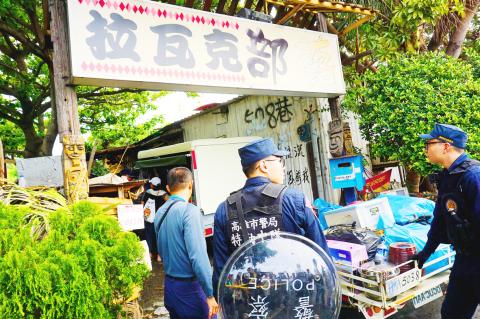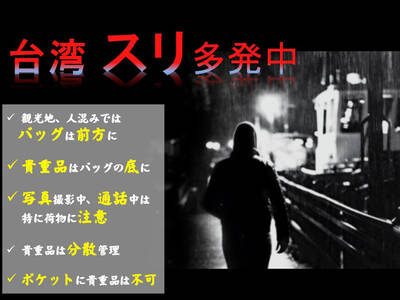Kaohsiung authorities yesterday began demolition of the Paiwan Ljavek community, tearing down 11 houses and leaving the remaining residents without water and electricity.
The Kaohsiung City Government on Jan. 22 issued a notice to residents that they had to leave their homes on Jhonghua 5th Road (中華五路) by March 20.
However, during a question-and-answer session at the Kaohsiung City Council on March 16, Mayor Chen Chu (陳菊) agreed to negotiate with the community’s residents, which led many of them to believe the government was reconsidering its eviction plan, the Ljavek residents’ group said.

Photo: Fang Chih-hsien, Taipei Times
Residents were shocked when they learned late on Sunday night that demolition had been scheduled to begin at 5:30am yesterday, the group said.
Residents held a news conference at 5:30am yesterday, urging the city to communicate with them before tearing down their homes.
About two hours after the news conference ended, the city government mobilized about 200 police officers and several excavators and began demolishing some of the structures.
Among the residents evicted by police was 81-year-old Chen Tien-chou (陳天球), who climbed on top of his house to protest the city’s actions, but was brought down by officers.
About 40 residents stood on the street and watched as the 11 houses were demolished: five that belonged to Paiwan families and six owned by ethnic Han.
The city government was a “bully,” said Kang Yi-ren (康義仁), who heads the residents’ group and whose family has lived in the community for three generations.
“The government was originally planning to tear down the houses at 5:30am, but it waited until the news conference was over and the crowd went away to begin the demolition. They did not even give us a formal notice. What kind of government is that?” Kang said.
“Chen Chu on March 16 said there was room for negotiation. How is demolishing our houses leaving room for negotiation?” Kang added.
While some houses are still intact, the demolition work damaged power and water supply lines, leaving the entire community without tap water or power.
The city government said the buildings were deemed illegal in 1999, and they were a fire hazard.
The government has offered residents compensation to move to two different locations in the city, but most residents have refused on the grounds that it would tear apart their Aboriginal community and undermine the preservation of their culture.
Kaohsiung City Councilor Chen Li-na (陳麗娜) said the Ljavek residents have lived in the community for more than 60 years and are the nation’s only Aboriginal community in an urban area.
Additional reporting by Ge Yu-hao

GENSLER SURVEY: ‘Economic infrastructure is not enough. A city needs to inspire pride, offer moments of joy and foster a sense of belonging,’ the company said Taipei was named the city with the “highest staying power” in the world by US-based design and architecture firm Gensler. The Taiwanese capital earned the top spot among 65 cities across six continents with 64 percent of Taipei respondents in a survey of 33,000 people saying they wanted to stay in the city. Rounding out the top five were Vietnam’s Ho Chi Minh City (61 percent), Singapore (59 percent), Sydney (58 percent) and Berlin (51 percent). Sixth to 10th place went to Monterrey, Mexico; Munich, Germany; Sao Paulo, Brazil; Vancouver; and Seoul. Cities in the US were ranked separately, with Minneapolis first at

The Japan-Taiwan Exchange Association has cautioned Japanese travelers to be vigilant against pickpockets at several popular tourist spots in Taiwan, including Taipei’s night markets, the Yongkang Street area, Zhongshan MRT Station, and Jiufen (九份) in New Taipei City. The advisory, titled “Recent Development of Concerns,” was posted on the association’s Web site under its safety and emergency report section. It urges travelers to keep backpacks fully zipped and carried in front, with valuables placed at the bottom of the bag. Visitors are advised to be especially mindful of their belongings when taking photos or speaking on the phone, avoid storing wallets and

Scoot announced yesterday that starting in October, it would increase flights between Taipei and Japan’s Narita airport and Hokkaido, and between Singapore and Taipei. The low-cost airline, a subsidiary of Singapore Airlines, also said it would launch flights to Chiang Rai in Thailand, Okinawa and Tokyo’s Haneda airport between December and March next year. Flights between Singapore and Chiang Rai would begin on Jan. 1, with five flights per week operated by an Embraer E190-E2 aircraft, Scoot said. Flights between Singapore and Okinawa would begin on Dec. 15, with three flights per week operated by Airbus A320 aircraft, the airline said. Services between Singapore

ENDORSING TAIWAN: Honduran presidential candidate Nasry Afura said that Honduras was ‘100 times better off’ when it was allied with Taipei The Ministry of Foreign Affairs yesterday said it would explore the possibility of restoring diplomatic relations with Honduras based on the principle of maintaining national interests and dignity. The ministry made the remarks in response to reporters’ questions regarding an article titled: “Will Taiwan Regain a Diplomatic Ally?” published in The Diplomat on Saturday. The article said Honduras’ presidential election in November could offer Taiwan the chance to regain an ally, as multiple candidates have promoted re-establishing diplomatic relations with Taiwan. Honduras severed diplomatic ties with Taiwan in March 2023 in favor of Beijing, but since switching its diplomatic recognition,